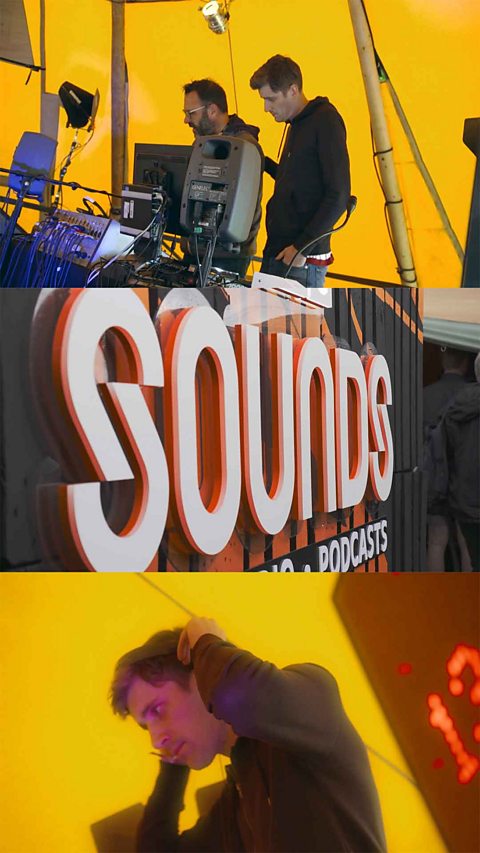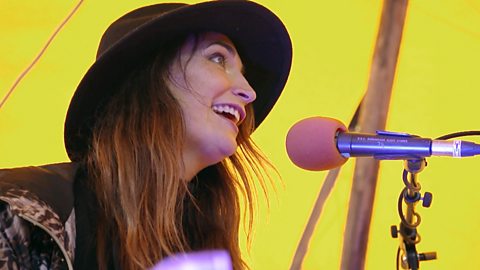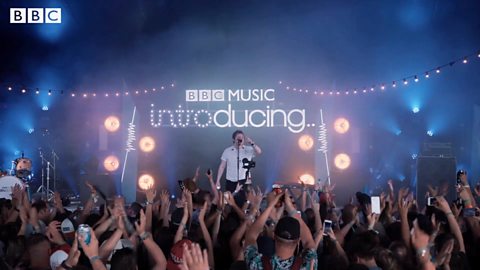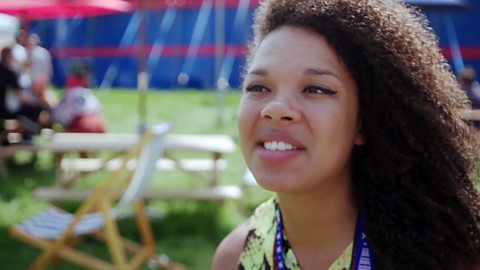Meet Phillip and find out more about life as a producer for BBC Radio 6 Music. Part of our Bitesize world of work series.
The producer is essentially in charge of all the output, so everything you hear through speakers, the producer is responsible for, so on an instance like today at the Bluedot Festival, I'm in charge of making sure that our presenter, Shaun knows exactly what to say, that the music is all compliant, that the guests are in the right place at the right time and making sure that everything that happens during the hours that we are on air is good radio.
I started working in BBC local radio when I was about sixteen, just doing work experience and reading out football results on the radio. That was pretty cool, then I went to university and studied Radio. So my degree was in Radio. After that I graduated and worked for a load of commercial stations and then I went to the BBC World Service and worked there for about two years before I came to 6 Music and I've been a producer at 6 Music for about ten years.
At school, probably I think the most important things I learnt that are useful in today's job that I do is English, learning to actually write a script properly is quite important, so punctuation, how to spell things properly. That's always really important, because you can write a script and deliver it to somebody and if the punctuation or the intonation is wrong, they won't deliver it in the way that you intend. Qualifications are great, they help you get your foot in the door, but working hard, being able to communicate with people, being able to get on as part of a team, you've got to work in a small creative group with other people. You've got to be able to generate ideas. You've got to be able to work up ideas, have enthusiasm for other people's ideas - that's really important in a small team. Also one of the most important things somebody needs to learn when they work in radio is to make a good cup of tea. It's the most important thing, because we thrive off tea!

Philip is a radio producer in charge of the afternoon show on BBC Radio 6 Music. He is responsible for the show running smoothly. He works closely with the presenter and makes sure that all the music is compliant and that all guests are in the right place at the right time
At 16, he did work experience in BBC local radio, announcing the football results. He went on to do a degree in Radio and worked for commercial stations before joining the BBC World Service. From there he moved into BBC Radio 6 Music and has been a producer on different radio shows for 10 years. During his career, Philip has produced drive time shows and breakfast shows and now works on the afternoon show with presenter Shaun Keaveny
The proper use of the English language is particularly important in this job as you need to be able to communicate well with your team and make sure the spelling and punctuation is correct when writing scripts
Qualifications are great to help you get your foot in the door, but it’s more important to work hard, get on with people and collaborate well in a team.

One of the most important things somebody needs to learn when they work in radio is to make a good cup of tea. We thrive on tea!

A radio producer has a similar skillset to TV or film producers, and they can be transferable in between the different sectors. TV and film producers plan and manage the business side of creating television programmes and films.
What to expect if you want to be a TV or film producer
- TV or film producer average salary: Variable. You may be self-employed/freelance
- TV or film producer typical working hours: 39 to 41 hours per week. You could work irregular hours and also away from home, and on evenings, weekends and bank holidays.
What qualifications do you need to be a TV or film producer?
You could get into this role via a university course or a college course such as a Level 3 Diploma or a T-level in Media, Broadcast and Production (England only). You can also do an apprenticeship, a broadcast training scheme or specialist training courses run by private training providers, or work towards the role.
Sources: LMI for All, National Careers Service, GOV.UK
This information is a guide and is constantly changing. Please check the National Careers Service website for the latest information and all the qualifications needed and the GOV.UK website for more on T-levels.
For careers advice in all parts of the UK visit: National Careers Service (England), nidirect (Northern Ireland), My World of Work (Scotland) and Careers Wales (Wales).


Find out more
Work experience in your area
Find work experience placements with Workfinder.
Tips and advice
Help with interviews, writing a CV and all things work experience related.


Clare: music news reporter. video
Clare is a music news reporter for BBC Radio 6 Music.

Jobs at music festivals and in the music industry
Find out about people working in the music industry and at festivals like BBC Radio 1's Big Weekend, Glastonbury and Blue Dot festival.

Jaguar: DJ and presenter. video
Jaguar is a DJ and presenter for BBC Introducing.
